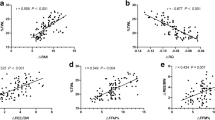Abstract
Background
Although Roux-en-Y gastric bypass (RYGBP) is a highly effective treatment for clinically severe obesity, not all patients achieve desirable weight loss and maintenance. There is some evidence that weight loss can induce a disproportionate reduction in resting metabolic rate (RMR). This reduction in RMR can be related to fat-free mass (FFM) loss, as FFM is the greatest responsible for variations in energy expenditure at rest. Abnormally low basal metabolic rate may predispose surgical patients to weight regain.
Method
Thirty-six individuals were divided into two groups: patients who have kept a healthy weight 2 years after surgery and patients who showed weight regain of at least 2 kg 2 years after the surgery. Selected patients have signed a consent form. Body mass index and excess weight loss were evaluated. RMR and body fat percentage were measured. FFM is a heterogeneous component that can be partitioned into muscle mass and no-muscle mass. The FFM was calculated as the result of subtracting total fat weight from total body weight in kilogram. We also wanted to know if the predictive formulas to assess RMR overestimate energy expenditure in these patients. Statistical tests were used to analyze the two groups.
Results
We found out that the RMR of the weight regain group was statistically inferior to the mean of the healthy weight group—the difference between the two groups was about 260 kcal/day. We also found out that the predictive formulas overestimate the RMR in the weight regain group.
Conclusion
This study suggests that a lower RMR may contribute to weight regain in patients who undergo RYGBP. It is important to ensure ways to elevate energy expenditure in the patient, such as increasing the percentage of fat-free mass in the body and the practice of physical activities.
Similar content being viewed by others
References
Buchwald H, Avidor Y, Braunwald E, et al. Bariatric surgery: a systematic review and meta-analysis. JAMA. 2004;292:1724–37.
Castro Cesar M, Lima Montebelo MI, Rasera I Jr, et al. Effects of Roux-en-Y gastric bypass on resting energy expenditure in women. Obes Surg. 2008;18:1376–80.
Astrup A, Gøtzsche PC, van de Werken K, et al. Meta-analysis of resting metabolic rate in formerly obese subjects. Am J Clin Nutr. 1999;69:1117–22.
Shah M, Simha V, Garg A. Long-term impact of bariatric surgery on body weight, comorbidities, and nutritional status. J Clin Endocrinol Metab. 2006;91:4223–31.
Carey DG, Pliego GJ, Raymond RL. Body composition and metabolic changes following bariatric surgery: effects on fat mass, lean mass and basal metabolic rate: six months to one-year follow-up. Obes Surg. 2006;16:1602–8.
Bobbioni-Harsch E, Morel P, Huber O, et al. Energy economy hampers body weight loss after gastric bypass. J Clin Endocrinol Metab. 2000;85:4695–700.
Sallet PC, Sallet JA, Dixon JB, et al. Eating behavior as a prognostic factor for weight loss after gastric bypass. Obes Surg. 2007;17:445–51.
Wardé-Kamar J, Rogers M, Flancbaum L, et al. Calorie intake and meal patterns up to 4 years after gastric bypass surgery. Obes Surg. 2004;14:1070–9.
Brolin RE. Weight gain after short- and long-limb gastric bypass in patients followed for longer than 10 years. Ann Surg. 2007;246:163–4. author reply, 164.
MacLean PS, Higgins JA, Johnson GC, et al. Enhanced metabolic efficiency contributes to weight regain after weight loss in obesity-prone rats. Am J Physiol Regul Integr Comp Physiol. 2004;287:1306–15.
Nelson KM, Weinsier RL, Long CL, et al. Prediction of resting energy expenditure from fat-free mass and fat mass. Am J Clin Nutr. 1992;56:848–56.
Tappy L, Binnert C, Schneiter Ph. Energy expenditure, physical activity and body-weight control. Proc Nutr Soc. 2003;62:663–6.
Author information
Authors and Affiliations
Corresponding author
Rights and permissions
About this article
Cite this article
Faria, S.L., Kelly, E. & Faria, O.P. Energy Expenditure and Weight Regain in Patients Submitted to Roux-en-Y Gastric Bypass. OBES SURG 19, 856–859 (2009). https://doi.org/10.1007/s11695-009-9842-6
Received:
Accepted:
Published:
Issue Date:
DOI: https://doi.org/10.1007/s11695-009-9842-6




